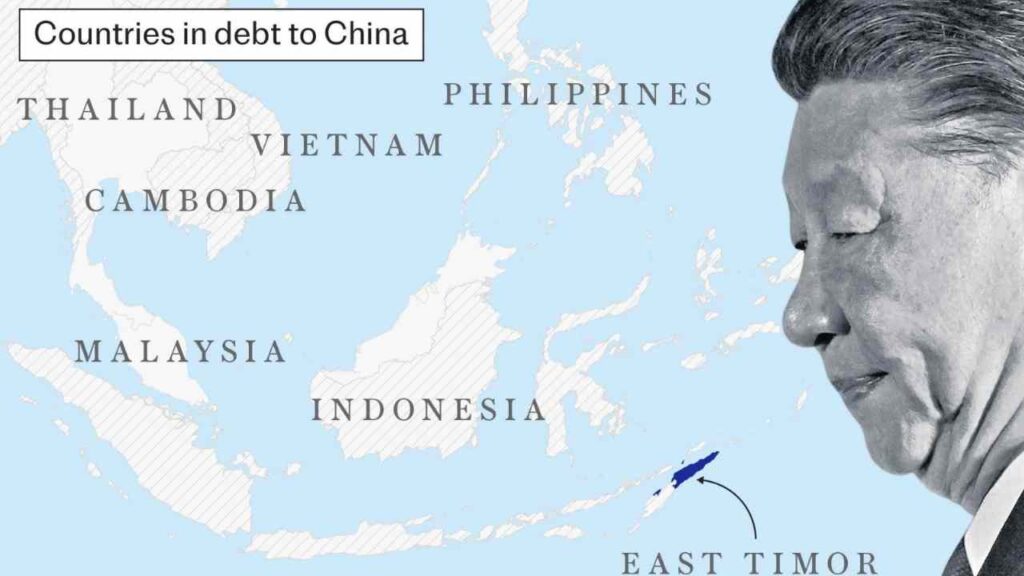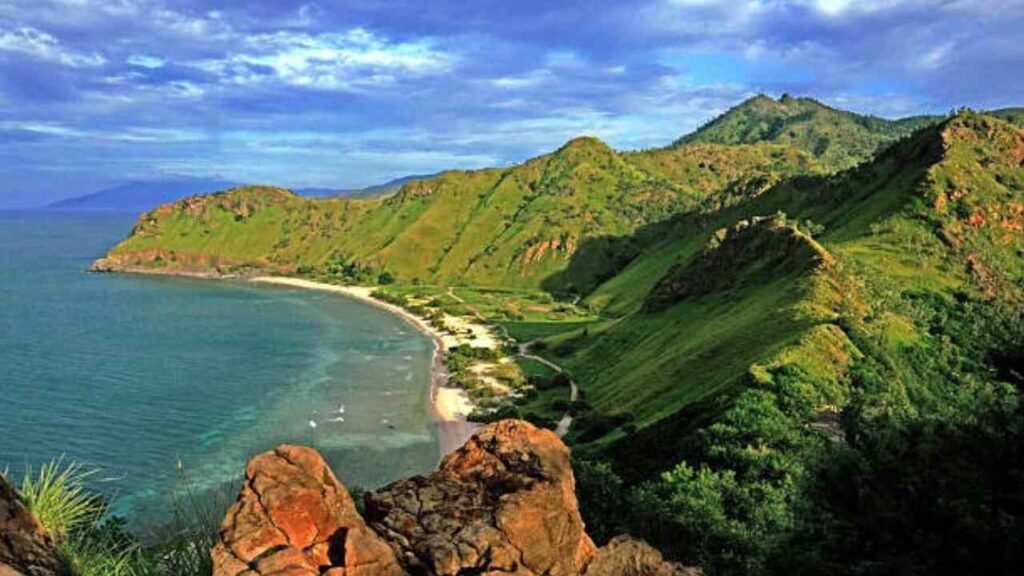The bustling Avenida de Hudi-Laran in Dili, East Timor’s capital, tells a story of quiet transformation. Where Portuguese and Tetum signage once dominated, Chinese business names now proliferate across restaurants, spas, and commercial establishments, leading locals to rename the thoroughfare “China-Laran” instead of its original “banana complex” designation.
This linguistic shift reflects China’s expanding economic footprint in one of the world’s youngest nations, yet East Timor has managed to avoid the debt trap diplomacy that has ensnared numerous regional neighbors—a delicate balancing act that may become increasingly difficult to maintain.
Strategic Geographic Significance
East Timor’s location makes it a natural target for great power competition. Positioned approximately 430 miles northwest of Australia and sharing the island of Timor with Indonesia, the nation occupies a crucial position near the contested Second Island Chain, stretching from Japan through Guam to Indonesia’s eastern archipelago.
The country’s proximity to the Ombai-Wetar Strait, a critical deep-water passage connecting the Indian and Pacific oceans, amplifies its strategic importance. US Defense Secretary Pete Hegseth acknowledged this significance in April, announcing increased American investment in the outlying island chain.
President José Ramos-Horta maintains East Timor’s neutral stance amid intensifying regional competition. “We do not view China as a threat, least of all as an enemy,” he told reporters, emphasizing his country’s commitment to balanced relationships across the Indo-Pacific.

Military Overtures and Rejections
China’s strategic interest in East Timor became apparent in 2007 when Beijing proposed constructing a radar facility allegedly designed to detect illegal fishing activities. However, leaked US diplomatic cables revealed the installation’s true purpose: intelligence collection on American and Taiwanese military operations in the South China Sea.
The East Timorese government rejected this proposal, demonstrating early resistance to potential military entanglement. While remaining open to joint military exercises with China, Ramos-Horta uses humor to describe the relationship’s asymmetry: “It’s a bit like an elephant inviting a mosquito for joint military exercises. The Chinese will take cruise missiles, we will take slingshots.”
Economic Engagement Without Debt Dependency
China’s involvement in East Timor’s development has been substantial yet structurally different from its approach elsewhere. Chinese funding supported construction of the presidential palace, foreign ministry, military headquarters, national power grid, and major port facilities. The 2023 upgrade to a comprehensive strategic partnership opened doors to “unlimited” economic cooperation.
However, East Timor has successfully avoided the debt trap mechanism that has compromised other nations’ sovereignty. Unlike Sri Lanka, which accumulated nearly $25 billion in Chinese debt before defaulting, East Timor has never accepted Chinese loans.
Ambassador to China Loro Horta emphasized this distinction, noting that Chinese firms have built infrastructure through “private tenders and grants” rather than loan arrangements, keeping Beijing’s influence “limited.”

Careful Financial Management
East Timor’s cautious approach became evident in 2012 when the government considered a $50 million Chinese loan for drainage system upgrades. Dili ultimately rejected the proposal because it granted Beijing excessive control over contractor selection, opting instead for funding from the Asian Development Bank and World Bank, which impose fewer restrictive conditions.
The nation’s “friends to all” policy ensures diversified partnerships, preventing over-dependence on any single benefactor. This approach contrasts sharply with Pacific island nations like the Solomon Islands, Kiribati, and Nauru, which switched diplomatic recognition from Taiwan to China after receiving substantial Chinese financial inducements.
Petroleum Dependency and Future Vulnerabilities
East Timor’s resistance to Chinese influence stems largely from petroleum revenue independence. Despite ranking among the region’s poorest countries by GDP per capita, annual petroleum earnings approach half a billion dollars, funding nearly 90 percent of the state budget.
This financial cushion faces an approaching expiration date. Experts predict complete depletion of the petroleum fund within the next decade, potentially leaving the country bankrupt unless new oil deposits are discovered.
Damien Kingsbury, professor emeritus at Deakin University, warns of the implications: “Small countries such as East Timor risk having large investors and donors such as China swamp their local economy and thus lose a capacity to make independent economic decisions.”
Historical Foundation for Independence
East Timor’s wariness of foreign domination stems from traumatic historical experience. Indonesian occupation from 1975 to 1999 resulted in approximately 200,000 deaths from a population of just 600,000, with widespread torture and civilian slaughter that scholars classify as genocide.
This bloody struggle for independence profoundly shaped current leadership perspectives. Prime Minister Xanana Gusmão spent years fighting Indonesian forces and enduring imprisonment, while President Ramos-Horta won the Nobel Peace Prize for his diplomatic efforts during the independence campaign.
Charlie Scheiner, a researcher at La’o Hamutuk human rights organization, explains the lasting impact: “Indonesia killed a lot of people, a lot of people suffered, and a lot of people sacrificed tremendously in order for it to be a sovereign nation and so they value that sovereignty.”
Leadership Experience and Diplomatic Sophistication
The leadership’s firsthand experience with foreign manipulation creates institutional memory that informs contemporary policy decisions. Michael Leach, professor at Swinburne University of Technology, notes that Ramos-Horta’s international diplomatic experience made him “no stranger to the sort of traps that small countries can fall into with foreign policy if they’re not careful.”
This expertise has translated into careful relationship management, with East Timorese leaders consistently balancing competing interests while maintaining sovereignty. The approach has earned regional recognition for diplomatic sophistication despite the nation’s youth and economic constraints.
Future Outlook and Challenges
Experts anticipate continued expansion of China-East Timor relations, particularly in economic spheres, but expect the relationship to remain within manageable bounds. The approaching petroleum revenue crisis presents the greatest test of East Timor’s ability to maintain independence.
However, Ambassador Loro Horta expresses confidence in his country’s resilience, noting with characteristic humor: “Timor will always be a democracy. We can never be a dictatorship because we are so disorganised and undisciplined – it’s impossible to have one country dominate Timor. Many have tried. They usually fail.”
Regional Implications
East Timor’s success in managing Chinese influence while avoiding debt dependency offers lessons for other small nations navigating great power competition. The country’s experience demonstrates that strategic geographic location need not inevitably lead to foreign domination, provided leadership maintains vigilance and diversified partnerships.
The nation’s approach contrasts with regional trends toward closer Chinese alignment, suggesting alternative pathways for countries seeking development assistance without compromising sovereignty. As competition for Indo-Pacific influence intensifies, East Timor’s balancing act will face increasing pressure, making its petroleum fund depletion timeline a critical factor in determining future strategic alignment.






